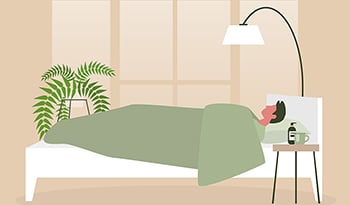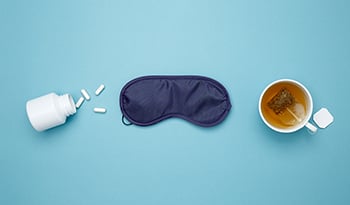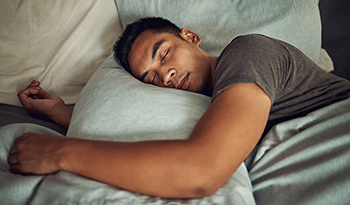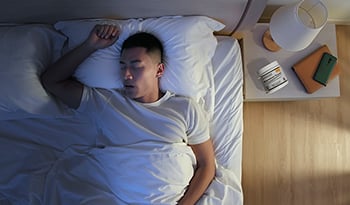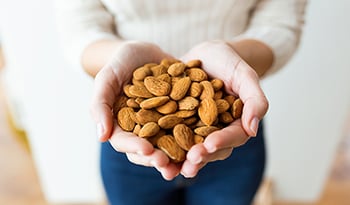Understanding Your Sleep Cycle and Tips for Better Sleep
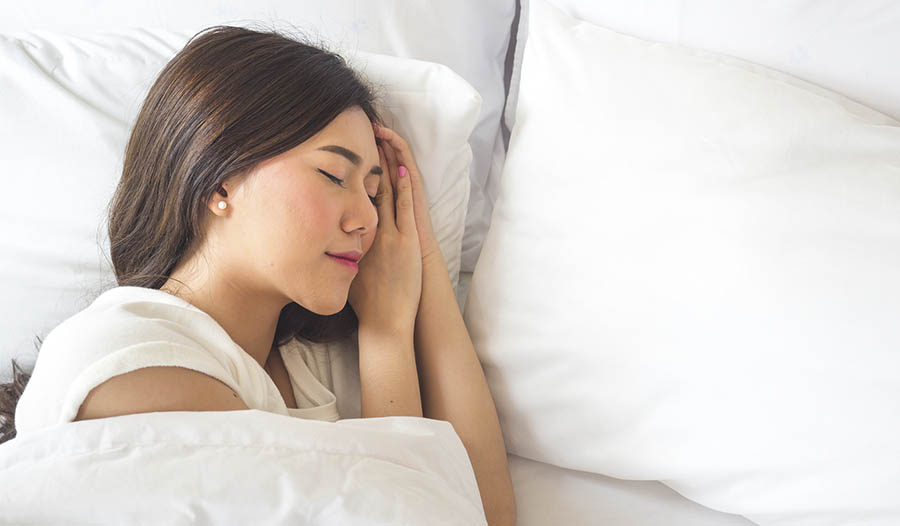
Nothing is worse than groggy mornings, afternoon slumps, and a general feeling of just being tired. Feeling fatigued seems like an epidemic, and almost everything about modern life contributes to it. But did you know that by obtaining a better understanding of your sleep cycles, that you can find ways to optimize your sleep to feel more energized and productive? Here’s how:
The 5 Phases of Sleep
Sleep cycles are made up of five phases:
Phase One: When you first drift off to sleep, your eye movements start to decrease and your brain produces waves called theta and alpha waves. This first phase doesn’t last too long, only about 5-7 minutes, so during this initial phase you may still be able to be woken up easily.
Phase Two: Brain waves start to increase and then slow down, while still keeping you in a fairly light sleep. If you’re going to take a nap, it’s best to wake up right after phase two to prevent feeling like you overslept.
Phase Three: Finally, you start to drift off into a deeper sleep and brain waves slow down even more into what is called delta waves. This is when all muscle activity and eye movements come to a stop and you become less alert to your surroundings. When you’re in phase three, it’s harder to be woken up by an alarm or a snoring partner.
Phase Four: Brain waves take it down yet another notch placing you in an even more highly regenerating sleep. This is when physiological repairs take place that help renew tissues and muscles, strengthen immune systems and stimulate cellular growth and energy to wake up the next day feeling refreshed.
Phase Five: This final stage the Rapid Eye Movement (REM) phase, begins about an hour and a half after you fall asleep, and this stage can last up to around an hour. After your brain slows down through all the previous phases, waves start to increase once again and this is when dreaming takes place. Everything else starts to get stimulated as well such as your heart rate and blood pressure, your eyes jerk around, and your breathing may become irregular. This phase is also extremely important as it helps foster memory and learning. Did you know it’s during this phase of sleep that your brain stores information and experiences for long-term memory? Amazing, isn’t it?
How Sleep Cycles Work
A full sleep cycle is about 90 minutes, meaning that you experience all five phases in an hour and a half. The first four phases of a sleep cycle are considered Non-REM (NREM) sleep, which means that we’re transitioning from light sleep into deep sleep. During NREM sleep, we don’t have much muscle or brain activity. REM sleep is when our brain is stimulated with dreams and information, which is equally as important as the restorative NREM sleep.
Here’s how the cycles work in a nutshell: during the first half of the night and more specifically, the first 2 to 3 sleep cycles, we are experiencing NREM sleep. We spend a significantly longer time in the REM phase during our final sleep cycles (typically in the early hours of the morning).
What does this mean for how much rest we ideally need? The answer is very tough as all of us are so incredibly unique. Just as there is not one diet fits all when it comes to nutrition, there isn’t a one-size-fits-all approach for how many hours of sleep we need. Some of us need between 9-10 hours a night, and others feel great on as little as six hours.
Tips for Better Sleep
If you find yourself feeling extra tired, there are a few steps you can take to make sure you are getting enough sleep cycles throughout the night.
- Wake up at the same time each day: Yes, even on the weekends. When you get into the habit of going to bed and waking up at around the same time each day, you create a natural internal alarm which can help regulate your sleep cycles or at least help them stay somewhat consistent.
- Take steps to ensure you reach deep sleep: Even if you get 7-8 hours of sleep, if you’re not reaching your deep sleep phase, you may feel tired the next day. Lifestyle habits such as consuming caffeine, drinking alcohol before bed, or outside stimulants like a partner’s snoring can prevent you from getting nourishing deep sleep. Some simple ways to make sure you reach deep sleep are making sure your bedroom is very dark and using the bathroom before you go to bed so that you don’t have to make bathroom trips in the middle of the night.
- Incorporate homeopathic remedies and herbs into your evening routine: Incorporating botanicals, herbs and supplements into your evening routine can help you wind down for the night and get higher quality sleep. The supplement melatonin is a hormone that we produce that helps us drift off, but when we are experiencing jet lag or added stress, supplementing with a little bit more of melatonin can help us swiftly drift off to sleep. Herbs like tulsi promote natural sedation and when consumed as tea can help us Zen out, and tinctures that contain ingredients like valerian root and chamomile can be taken directly under your tongue for quick absorption and fast-acting relief.
- Avoid smartphones and screens before bed: Watching TV or scrolling through social media on your phone gives your brain too much stimulation before you try to wind down, and the blue light that is emitted from screens can also interfere with your sleep cycles. Try reading for 30 minutes before bed or doing another activity that doesn’t require technology.
Supplements and Herbs For a Better Night’s Sleep
Besides all the different and easy lifestyle shifts you can incorporate into your life for a better night’s sleep, there are also some natural remedies you can add to your routine! Let’s take a look at some of the most common ones out there.
Melatonin: This specific supplement is already found naturally in your body as it is a hormone that is created in your brain. Melatonin has the purpose of regulating your sleep-wake cycles and is commonly used for those experiencing jet lag. If you’re experiencing insomnia or having troubles falling asleep, you can take between 1-10 milligrams between thirty minutes to an hour before you want to fall asleep.
Tulsi: Also known as Holy Basil, this herb hails from Southern Asia and was discovered centuries ago. The active ingredient in tulsi, Eugenol, is what gives it its anti-stress and calming effects. It helps our body regulate our cortisol levels so that we don’t accumulate too much of this stress-inducing hormone. In the evening, you can sip on tulsi tea or take it in tincture form to work its magic.
Valerian root: This root comes from a flowering plant that smells quite sweet in parts of Asia and Europe and is said to help stimulate GABA production in our brain. GABA is a neurotransmitter that helps us regulate our nervous system so that we don’t feel too jittery and can lower feelings of anxiety and stress. It takes a few weeks for the effects of valerian root to build up and it’s best to consume valerian root a few hours before you want to hit the hay.
Chamomile: One of the more popular herbs (it’s actually a flower) you may have heard of. Chamomile is widely consumed as tea and helps calm down pretty much everything in our body. It lowers inflammation, can calm down a distressed tummy, and help us Zen out just in time for bed. You can add a dash of honey to your chamomile tea to get a bonus dose of antioxidants.
By having a better understanding of how our sleep cycles actually work and implementing these easy steps to feeling rested the next day, you’ll be able to take more control of your bedtime routine and your sleep schedule. By making these simple shifts before you wind down for the evening, you can say adios to that second (or third) cup of coffee to keep you alert throughout the day, or that glass of wine to help you drift off to bed. Sweet dreams!
DISCLAIMER:This Wellness Hub does not intend to provide diagnosis...

















































































